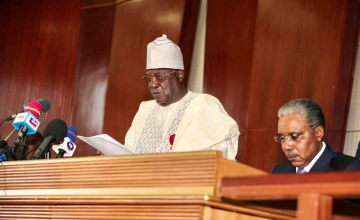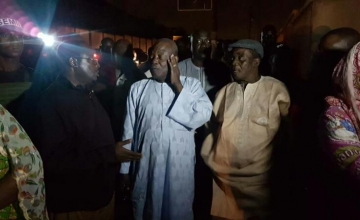_GDN_cameroon-info-p-net_800xm9x.jpg)
Seen at the time as a genuine effort to resolve what has become known as the Anglophone crisis, the events on the ground seem to be giving skeptics a field day.
Although boycotted by separatists over personal safety concerns, the Major National Dialogue grouped no fewer than a thousand stakeholders who made several recommendations including a “special status” for the North West and South West Regions.
The Recommendations
Among the many recommendations was that to grant special status to the North-West and South-West Regions, in conformity with Section 62 Sub 2 of the Constitution which states that, “Without prejudice to the provisions of this Part, the law may take into consideration the specificities of certain Regions with regard to their organization and functioning.”
After the deliberations from September 30 to October 4, 2019, the government was among other things urged to: Take specific measures to ensure equality of English and French in all aspects of national life; Reinforce the autonomy of Decentralised Local Entities; Improve upon the infrastructure of judicial services throughout the country; Strengthen the Humanitarian Assistance Program to better serve internally displaced persons; Institute a special plan to reconstruct the conflict-affected areas; Popularise the Head of State's offer of amnesty to combatants who drop their weapons and enter the reintegration process; and, Create a team responsible for mediation with radicalized members of our Diaspora.
Shortly after the end of the Major National Dialogue, President Paul Biya took to his social media handles promising that all recommendations will be given due consideration.
“I can assure you that all of them will be considered attentively and diligently with a view to implementing them, taking into account their relevance and feasibility, as well as the capacities of our country,” said Biya on October 4, 2019, a day after ordering that charges be dropped against 333 prisoners arrested for their alleged roles in the Anglophone crisis.
Maurice Kamto, along with over 102 members and supporters of his opposition Cameroon Renaissance Movement, CRM, arrested between January and June 2019 after nationwide protests, was also freed on October 5 following a presidential pardon the previous day.
Many were however quick to dismiss the presidential gestures as political stunts, especially given that a huge number of persons considered “political prisoners” remain in jail.
On March 23, 2020, President Biya created a committee to follow-up on the implementation of the recommendations of the Major National Dialogue. The committee placed under the authority of the Prime Minister, Head of Government, expected to meet once every semester, only held its first session on September 3, with the delay blamed on the COVID-19 pandemic.
Achievements
Many a Cameroonian expected that the recommendations of the Major National Dialogue were going to be implemented at the speed of light in a bid to succor the pain of the people living in the North West and South West Regions.
The slow pace of implementation notwithstanding, steps have been taken to realize some of the recommendations while others are currently under execution. Reforms engaged in favor of the peace process include the recruitment and absorption into the judiciary of the first batch of common law-trained magistrates, the creation of a common-law section at ENAM and at the Supreme Court, the special recruitment of 500 translators and translator-interpreters into the civil service, and the promulgation of the law on the promotion of the two official languages.
The law on regional and local authorities expected to fast-track the decentralization process went into force in December. The Local Government Training Centre, CEFAM was transformed into the National School of Local Administration, NASLA to train manpower for the decentralization process.
The Presidential Plan for the Reconstruction and Development of the North West and South West Regions (PPRD-NW/SW) is already on the field. Its National Coordinator, Paul Tasong and Deputy, Donatus Njong are expected to ensure “the rehabilitation of about 350 schools, 115 health centers, 40 bridges, 400 power points, 500 KM of Low tension power points, 600KM of rural roads, 45 markets, 12000 houses, 25000hectares of farmland, livestock lost by grazers, the reestablishment of close to 3000 personal documents lost.”
Way Forward
It emerged from the first session of the committee to follow up on the recommendations of the Major National Dialogue that government will create an industrial zone that will provide no fewer than 9,000 jobs for internally displaced persons, IDPs, and returnees.
Stakeholders called for collective action to sustain peace efforts, encourage school resumption, stop ghost towns, and ensure people in the affected regions live under acceptable security and social standards.
The Regional Elections of December 6, 2020, will be the culmination of the setting up of decentralized structures in the country, in line with the 1972 constitution with amendments from 1996 to 2008.
The new context is expected to redefine the socioeconomic and political life of citizens of the North West and South West Regions, especially with the rebirth of the House of Chiefs and the regional assemblies that put the governance of these regions in the hands of locals.
Special Status
The content of the Special Status promised the North West and South West regions remains a guarded secret. Many had described it as an empty calabash that has to be filled with a drink pleasant to the masses.
Unaware of the form the Special Status will take, many are those who mistook the law on regional and local authorities to mean the law on Special Status for the North West and South West regions.
Mention of the Special Status is however made in Book Four, Part V of the Law on Regional and Local Authorities, from sections 327 to 370. Despite Cameroon being a decentralized unitary state, the North West and South West regions will have some extra considerations owing to their language and historical background states the law.
Section 3(1) of Law 2019/024 of 24 December 2019 provides that: "The North West and South West regions shall have a Special Status based on their language specificity and historical heritage".
Section 3(2) furthers that: "The Special Status referred to in subsection (1) above shall be reflected with regard to decentralization, in specificities in organization and functioning of these two regions.
"In this same light, subsection three (3) makes it clear that: "The Special Status shall also entail respect for the peculiarity of the Anglophone education system and consideration of the specificities of the Anglo-Saxon legal system based on Common Law".
In subsection four (4), where every task now lies, it states that: "The content of the specificities and peculiarities referred to in subsections (2) and (3) above shall be specified in separate instruments".
While waiting for these instruments to see the light of day, the Law on Regional and Local Authorities states in its section 328 that: “In addition to powers devolved on regions by this law, the North West and South West Regions shall exercise the following powers;
“-participating in the formulation of national public policies relating to the Anglophone education sub-system;
“-setting up and managing regional development authorities;-participating in defining the status of traditional chiefdoms.”
Section 328(2) of the said law adds that: “The North West and South West Regions may be consulted on issues relating to the formulation of justice public policies in the Common Law system.”
“They may be involved in the management of public services established in their respective territories,” section 328(3) states.
On the organs of the North West and South West regions, sections 329 and 330 state that these regions "Shall be administered freely by elected organs, under the conditions laid down in this law," adding in the proceeding section that these organs shall be "the regional assembly and the regional executive council."
Section 332 clarifies that "the regional assembly shall be composed of 90 (ninety) regional councilors elected for a five-year term of office with the regional assembly comprised of two houses: the House of Divisional Representatives and the House of Chiefs.
Jailed Ambazonia leaders shift stance, but rivalries hamper talks
Despite the steps being undertaken by the government, a cessation of hostilities and violence in the restive regions remains farfetched.
In July, Jeune Afrique reported that peace talks involving the government of Cameroon and Anglophone separatists are at a standstill due to a power struggle playing out between Prime Minister Joseph Dion Ngute and the secretary-general at the presidency of the republic Ferdinand Ngoh Ngoh.
On 2 July, the jailed secessionist leader Sisiku Ayuk Tabe announced on social media that he had taken part in discussions with Cameroon’s government regarding a ceasefire agreement under the auspices of the United Nations.
Days later, communication minister and government spokesman René Emmanuel Sadi said in a statement that this information was not “consistent with reality”. The move is said to have iced contact between the two parties.
Jeune Afrique quotes sources as saying that a delegation made up of about 10 secessionist leaders led by Ayuk Tabe did in fact meet on July 2 with Léopold Maxime Eko Eko, head of the Direction Générale de la Recherche Extérieure, DGRE, Cameroon’s counter-intelligence agency.
Given that the conditions set forth by the Ambazonian leaders included that the meeting takes place in a “neutral” setting, the government asked the Catholic Church to allow it to hold the talks at the Episcopal Centre of Mvolyé. Located in Cameroon’s capital, the church was ultimately selected as the site of the negotiations, which were attended by six other government representatives.
At the end of these talks, some progress was made, as the separatists said they were prepared to abandon their most radical demand, i.e., the departure of Cameroon’s army from the North West and South West regions. However, their acceptance of the continued presence of these troops came with the condition that they remain in their barracks since, in their view, the police and gendarmerie forces should be the sole personnel permitted to be deployed on the ground.
“Dion Nguté and Eko Eko excluded the rest of the administration from secret negotiations which nevertheless had the blessing of President Paul Biya. Even Ngoh Ngoh was not involved in the discussions, despite the fact that he had been the Swiss government’s primary contact since June 2019,” Jeune Afrique reported.
It furthers that Yaoundé officially mandated the Swiss government to facilitate talks between the warring sides. Working with the Geneva-based Centre for Humanitarian Dialogue (HD), the Swiss mediators invited several secessionist leaders to participate in a discreet preparatory meeting from 25 to 27 June in Saint-Luc, a small village in the canton of Valais. However, at the end of 2019, the HD-led mediation process ended in failure due to distrust from certain factions of the secessionist movement.
New round of Swiss mediation
On August 2, a delegation led by Günther Bächler arrived in Yaoundé. The 67-year-old diplomat and former Swiss ambassador to Georgia served as a mediator in conflicts in Darfur, Nepal, and in the South Caucasus on behalf of the Swiss Foreign Ministry.
As soon as he arrived in Cameroon, Bächler got in touch with a number of people, not just separatists but also supporters of federalism and proponents of decentralization. On 4 August, he met with Cardinal Christian Tumi. On 6 August in Buea, the capital of the South West region, the delegation met with other local Anglophone figures.
It is hoped that the talks will pull through for peace to return to the restive regions so that locals can enjoy the benefits that come with reforms that are underway.














